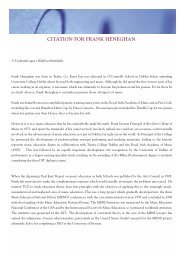TWICE THE SIZE - DIT Update - Dublin Institute of Technology
TWICE THE SIZE - DIT Update - Dublin Institute of Technology
TWICE THE SIZE - DIT Update - Dublin Institute of Technology
Create successful ePaper yourself
Turn your PDF publications into a flip-book with our unique Google optimized e-Paper software.
SCENARIO 3: I met the enemy, it’s us! (National scenario: <strong>THE</strong> FRAGILITY OF MÉ FÉIN)<br />
Headline Article in the Carlingford Chronicle reporting on the demise <strong>of</strong> the BMW region…, 29 th<br />
October 2030.<br />
Headline: ‘BMW in need! Region in need <strong>of</strong> most support and intervention’<br />
Failure <strong>of</strong> the Northern Ireland peace process in 2010 sparked a major resurgence in terrorist<br />
activity, reaffirming the significance <strong>of</strong> the north–south border. Security emerged as the highest<br />
social priority with policing on alert and commonplace. Belfast quickly became isolated from the<br />
rest <strong>of</strong> the island, as the Irish Government retracted its involvement in the Northern political<br />
process. Feelings <strong>of</strong> mistrust, fear and resentment developed within society with little or no<br />
cross-border relations. Growth and development is primarily confined within the Republic as<br />
economic links between Dundalk and Belfast are severed. As foreign investment dried up after<br />
2012 it has left a high percentage <strong>of</strong> the population unemployed and desolate.<br />
Major job losses following the closure <strong>of</strong> Dundalk’s ABB’s manufacturing plant are a bitter blow<br />
to a region that has seen a steady decline in its economic fortunes over the past decade. This<br />
was followed by a serious downturn in farming, which was traditionally the big employer in rural<br />
areas. By 2016 a number <strong>of</strong> smaller scale production plants had followed suit, leaving local<br />
politicians and business people fearing the worst for the local economy. By 2020 the north East<br />
region has been thrown into turmoil.<br />
While vast outward expansion from <strong>Dublin</strong> between 2010 and 2020 endowed Dundalk with an<br />
abundance <strong>of</strong> human resources, particularly highly skilled immigrant workers, failure to develop<br />
a strong integrated immigration policy resulted in ethnic marginalisation, as immigrant ghettos<br />
mushroomed around the town. Modest attention was paid to emerging social issues, and as a<br />
result, the quality <strong>of</strong> life was poor. Unemployment was high, and a strong dependence on<br />
welfare began to emerge. Safety on the streets was non-existent and Dundalk, in particular, had<br />
entered a time <strong>of</strong> deprivation. While political and economic regionalism over the previous two<br />
167<br />
For many, emigration was the<br />
only option. By 2030 population<br />
growth reaches an all time low,<br />
as the majority <strong>of</strong> the youthful<br />
and educated population<br />
migrate southwards. With less<br />
than 40,000 people, the<br />
knowledge drain <strong>of</strong> graduates<br />
out <strong>of</strong> the region has had severe<br />
economic and social impacts.








